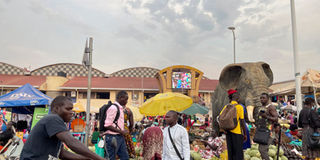Prime
Uganda’s labour market is fragmented, says report

A man rides a motorcycle near a market in Kampala. Job centres should be created at local government level to coordinate labour market information to match vacancies with relevant skills to unemployed persons. PHOTO /EDGAR R. BATTE
What you need to know:
Whereas there is steady movement of labour from agriculture to the services sector, the movement is not accompanied by growth in decent jobs.
KAMPALA. Uganda’s current labour market is fragmented in terms of information supply and demand for labour, the 2021 poverty status report by the Finance Ministry shows.
The report with support from the United Nations Development Programme, titled ‘Jobs informality and poverty in Uganda: insight on performance before and during Covid-19,’ states that whereas there is steady movement of labour from agriculture to the services sector, the movement is not accompanied by growth in decent jobs.
“This has led to an increase in the size of the informal sector,” the report states.
As such, it recommends that establishing a labour market information system will help coordinate, collect, process, store, retrieve and disseminate labour market information. The system will guide labour force planning, identification of skill gaps, labour demands and supply trends.
“Job centres should be created at local government level to help coordinate labour market information to match vacancies with relevant skills to unemployed persons who wish to acquire employable skills,” the report recommends.
Under Financial Inclusion, the report reveals that households with access to financial services are less likely to be poor.
Digital finance
The emergence of digital financial services has helped to accelerate financial inclusion, expansion of the requisites infrastructure for digital financial services should continue to receive priority within public investment planning.
There is a need to increase funding under the financial inclusion pillar of the Parish Development Model. In this regard, it recommends that a mechanism for the recovery of loans under revolving funds should be put in place to ensure the scheme’s sustainability.
In the report’s foreword, Ms Elsie G. Attaufauh, the resident representative United Nations Development Programme wrote: “These findings confirm that eradicating poverty in all its forms will not be guaranteed solely by raising the incomes of the poor.”
She said this because poverty is multifaceted with several interlinked dimensions such as education, water and sanitation and hygiene and employment which are critical in enlarging the freedoms and opportunities for the most vulnerable.
“I therefore commend the government’s efforts to develop a multidimensional poverty index for Uganda to complement this report for deeper understanding of the poverty situation in Uganda,” she wrote in the foreword.
The Permanent Secretary/Secretary to the Treasury, Mr Ramathan Ggoobi said: “The report explores Uganda’s transformation agenda, which is hinged on transforming the livelihoods of households from low to high productivity activities, and sectors while minimising vulnerabilities to poverty at the same time.”
Mr Ggoobi added: “This is in tandem with various international development frameworks such as the Global 2030 Agenda for sustainable development (2030 Agenda) and its 17 Sustainable Development Goals to which Uganda is a signatory.”




